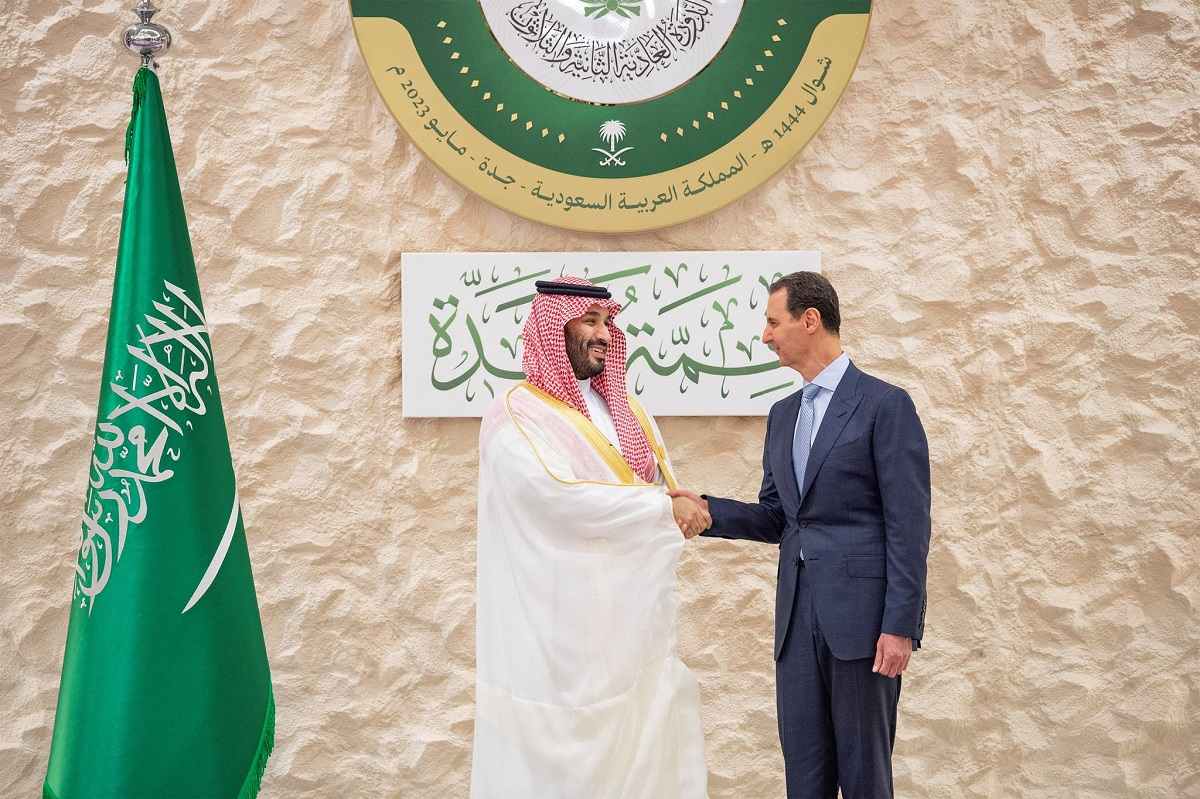JEDDAH, Saudi Arabia, (Reuters) – Syrian President Bashar al-Assad was given a warm welcome at an Arab summit today, winning a hug from Saudi Arabia’s Crown Prince at a meeting of leaders who had shunned him for years, in a policy shift opposed by the U.S. and other Western powers.
Assad, long ostracised by Arab states as he turned the tide of Syria’s civil war with Russia’s help, was joined at the summit by Ukrainian President Volodymyr Zelenskiy, who wants to build support for Kyiv’s battle against Russian invaders.
Gulf states have tried to remain neutral in the Ukraine conflict despite Western pressure on Gulf oil producers to help isolate Russia, a fellow OPEC+ member.
Saudi Crown Prince Mohammed bin Salman, in a speech, said Riyadh stood ready to mediate between Russia and Ukraine.
Zelenskiy, also addressing the summit, asked the delegates to support Ukraine’s formula for peace and thanked Riyadh for its role in mediating a prisoner release last year.
Crown Prince Mohammed shook hands with Assad and hugged him before an official picture was taken ahead of the meeting.
“We hope Syria’s return to the Arab League leads to the end of its crisis,” Crown Prince Mohammed said in his remarks, 12 years after Arab states suspended Syria as the country descended into a civil war that has killed more than 350,000 people.
Oil powerhouse Saudi Arabia, once heavily influenced by the United States, has taken the diplomatic lead in the Arab world in the past year, re-establishing ties with Iran, welcoming Syria back to the fold, and mediating in the Sudan conflict.
Washington has objected to any steps towards normalisation with Assad, saying there must first be progress towards a political solution to the conflict.
“The Americans are dismayed. We (Gulf states) are people living in this region, we’re trying to solve our problems as much as we can with the tools available to us in our hands,” said a Gulf source close to government circles.
One highly sensitive issue is Assad’s close ties to the Iranians, which makes Arab state uneasy.
A Gulf analyst told Reuters that Syria risked becoming a subsidiary of Iran, and asked: “Do we want Syria to be less Arab and more Iranian, or … to come back to the Arab fold?”
Having welcomed back Assad, Arab states want him to rein in Syria’s flourishing drugs trade in exchange for closer ties.
Alongside the return of millions of refugees who fled Syria, the captagon trade has become a big worry for Arab leaders, on a par with their concern about the foothold established by Shi’ite Islamist Iran in the Arab country.
The war has shattered Syria’s economy, demolishing infrastructure, cities and factories. Assad would no doubt benefit from Gulf investment in his battered country, though U.S. sanctions complicate any commercial ties with Damascus.
The Arab rapprochement with Assad gained momentum after China negotiated an agreement in March that saw Riyadh resume diplomatic ties with Iran, which with Russia has helped Assad defeat Sunni rebels and regain control of some major cities.
A large swathe of Syria, however, remains under Turkish-backed rebels and radical Islamist groups as well as a U.S.-backed Kurdish militia.
Finding a political solution to the 12-year-old conflict remains a big dilemma for Arab and Western countries.
According to UNHCR since 2011, more than 14 million Syrians have been forced to flee their homes. Around 6.8 million Syrians remain internally displaced in their own country where 90 percent of the population live below the poverty line.
About 5.5 million Syrian refugees live in the five neighbouring countries – Turkey, Lebanon, Jordan, Iraq and Egypt.
Assad is due to speak later on Friday.
The Syrian state news agency said Qatari Emir Sheikh Tamim bin Hamad al-Thani shook hands with Assad, though there was no immediate confirmation of that in Qatari media.
In 2018, the Qatari emir said the region could not tolerate “a war criminal” like Assad. Qatar hosted an Arab summit a decade ago at which the Syrian opposition sat in Syria’s seat.
Ahead of the summit, the U.S. State Department reiterated opposition to normalisation of relations with Damascus and said sanctions should not be lifted.
But State Department deputy spokesperson Vedant Patel added that “we have a number of shared objectives” such as bringing home Austin Tice, a former U.S. marine and journalist who was kidnapped in Syria in 2012.
Then U.S. President Donald Trump branded an “animal” for using chemical weapons in 2018 – a weapon he consistently denied using. Assad rarely left Syria after the war began, going only to Iran and Russia until 2022, when he visited the United Arab Emirates – his first trip to an Arab country since 2011.
Salem Al-Meslit, a prominent figure in the Syrian political opposition to Assad, wrote on Twitter that his attendance was a “free reward for a war criminal”.
Assad’s return to the Arab fold is part of a wider trend in the Middle East where adversaries have been taking steps to mend ties strained by years of conflict and rivalry.






